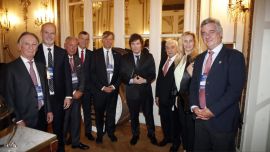Argentina’s dollar bonds are recovering from a week-long rout after President Javier Milei struck a more conciliatory tone during the introduction of next year’s budget, raising hopes he can gain support ahead of midterm elections next month.
Sovereign notes rose across the curve, with the 2035 maturities gaining more than a cent to trade above 54 cents on the dollar, according to indicative pricing data compiled by Bloomberg. Meanwhile, the currency halted a six-day slide, trading little changed only a few pesos away from the weaker limit of its trading band.
Milei told lawmakers he would increase spending on health-care, education and pensions in 2026, while sticking to his policy of a fiscal surplus. He also held out an olive branch to provincial governors, whose support would help him perform better in the October 26 vote. The libertarian president needs to gain seats in Congress to keep his plan to overhaul the economy on track.
“Milei’s address marked a first step toward moderation, aimed at building consensus with governors and preventing further erosion of support among swing voters hit by weak economic activity and fiscal austerity,” Juan Sola, an analyst at Banctrust & Co said in a report to investors Tuesday.
Milei’s speech provided a respite for the country’s assets that had posted heavy losses following the government’s worst-than-expected defeat in a local election in Buenos Aires Province on September 7. The sovereign bonds hit their lowest in almost a year, while the currency threatened to breach its trading band.
This “move toward the centre” in Milei’s speech could help unify support against Peronist opposition, while reinforcing credibility, said Trevor Yates, Senior Investment Analyst at Global X ETFs. “This more balanced strategy leaves us cautiously optimistic heading into the mid-terms as Milei could gain support from a broader coalition,” he said.
Still, with economic growth stalling following a spike in interest rates and the peso threatening to weaken and revive inflation, it is far from plain sailing for Milei.
“Expanding some expenditures with potentially less revenue than projected is a difficult combination, and this is before we have clarity on the midterms,” said Brendan McKenna, an emerging markets economist and FX strategist at Wells Fargo. “Even though prices are a bit more attractive now, the downside can still be large” if Milei’s party underwhelm again in October.
Milei’s spokesman Manuel Adorni reinforced the message of self-reflection in a press conference on Tuesday.
“Clearly there’s a sector of Buenos Aires Province to whom we were unable to explain what we had done, what moment we were going through, and where we were headed,” he said.
Currency boost
Amid the political turmoil, the government has been stepping up efforts to keep the peso within its trading band, which was set up as part of a US$20-billion deal with the International Monetary Fund. The Central Bank has expanded sales of dollar futures contracts in the local market, while the securities commission on Friday moved to limit dollar demand from brokers by reinterpreting an existing rule.
This week, Argentina’s local exchange BYMA authorised the Central Bank to sell up to US$6 billion in dollar futures, according to people with direct knowledge of the matter. The decision was communicated to market participants via email.
Although BYMA is the country’s main stock exchange, most of the futures trading takes place in the A3 market, which focuses on derivatives, fixed income, FX, and commodities. The Central Bank currently has an open interest limit of US$9 billion in the A3 market, where it already holds about US$6 billion in positions.
related news
by Nicolle Yapur & Ignacio Olivera Doll, Bloomberg




















Comments